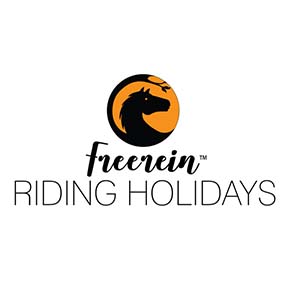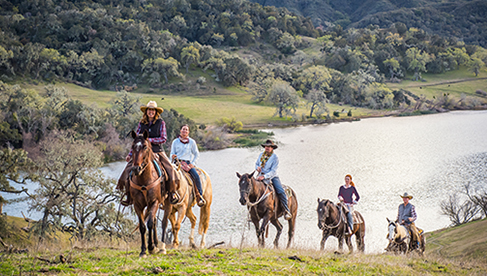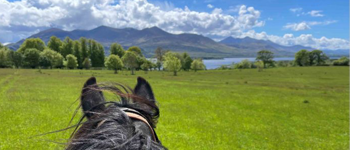Horse Rescues: Helping Unwanted Horses
Learn about Unwanted Horses in America, spotlighting Days End Horse Farm and Kentucky's Secretariat Center
By Equitrekking host Darley Newman
Lately, more and more people are talking about the unwanted horse problem in America. It seems to be everywhere I turn, and not just in the news. I’m hearing stories from friends and fellow riders, from chain emails calling out for help, social networking postings and more.
There are a variety of reasons that horses end up in horse rescues, including the recent economic downturn.
Some of the worst cases end up at Days End Farm Horse Rescue, not too far from my neck of the woods, in Maryland horse country. On a recent tour of Days End with Kathy Schwartz-Howe, who started the rescue, and Sue Mitchell, the Development Director, I met some of the horses that get a chance at life through Days End and heard the heartbreaking and heartwarming stories of their journeys.
To get to Days End’s 58-acre farm, a horse must be impounded by Animal Control or law enforcement, which means that Days End gets some of the most extreme cases. These horses are victims of starvation, neglect, and abuse. They require critical care and their situation must be meticulously documented. Many of the horses are evidence in criminal cases. The eventual goal with each horse is adoption and Days End touts their 94% success rate. Besides rescue and rehab work, Days End also performs large animal rescues and has a loyal network of volunteers who help keep the farm going by training, feeding and grooming horses, building sheds, taking on office work… whatever it takes to keep Days End running, which is quite a lot.
“The vast majority of horses that make it to Days End are starvation cases, registering a 3 or less, out of a possible score of 9, on the Henneke Body Condition scale,” said Sue Mitchell. “Starvation is almost always accompanied by other ‘lack of care’ conditions including parasitic infestation, overgrown hooves and teeth, untreated wounds and injuries, skin funguses and a host of other medical issues.”
As I walked around the stalls of some of the sickest horses at Days End, Kathy told me the story of the first horse that she rescued over 20 years ago and about the various horses that Days End is trying to save. It was hard to see these horses up close, even harder to pet one emaciated horse that could barely keep his head up. His owner was an elderly man, who could no longer care for the horse or himself. Some horses at Days End come in because their owners are mentally ill or elderly. In many cases, the horses’ owner is ignorant about horse care. Whether its intentional or not, the horses suffer. There are over 70 horses at the farm right now, and most of these are just from Maryland. Recently, Days End received 19 new rescues in one day. When horses come to the farm, there is not always a lot of notice. I couldn’t believe that there would be so many horses just at this one rescue and so many horses across the U.S. who are not only unwanted but also abused.
To find out more about the scope of the problem and the main causes, I spoke with Ericka Caslin, Director of the Unwanted Horse Coalition, an organization whose mission is to reduce the number of unwanted horses in America.
“The Unwanted Horse Coalition recently published a survey entitled the 2009 Unwanted Horses Survey. The top contributor to the problem of unwanted horses cited by our respondents was the downturn of the economy,” said Ericka. “Getting people to think about unwanted horses and understand that there is a problem is extremely important.”
While filming our Equitrekking Kentucky episode, I had the opportunity to visit a horse rescue in Lexington, Kentucky, which focuses on helping rehabilitate Thoroughbred racehorses and finding them new homes. At the Secretariat Center, I met a special horse named King Dee, who after a short racing career fraught with injuries was on his way to a slaughterhouse when someone saved him. He ended up at the Secretariat Center, where trainers have been working to mend the damage done by his racing days in the hopes that King Dee may go on to find a loving home.
Rehabilitating unwanted and problem horses is a time-consuming, expensive and sometimes dangerous proposition, but for those that work with these horses, it’s all worth it.
“For me, watching the light return to a horses’ eye. So many horses arrive here clearly suffering, with an absolutely heartbreaking expressionless stare… almost as if they have accepted pain and misery as a way of life. The privilege of watching light and life return is an amazing experience,” said Sue Mitchell. “And of course, watching a horse come full circle from critical care intervention to a healthy, happy equine leaving for his or her forever home is an incredibly fulfilling feeling.”
Melanie Higdon, who owns and runs Hidden Springs Horse Rescue, a smaller, newer non-profit rescue in Florida feels similarly about her important work. One of Melanie’s volunteers, a fan of Equitrekking, reached out to me to tell me about Hidden Springs and Melanie’s story in the hopes that we’d be able to visit their farm on our next trip to Florida.
From her 120-acre farm in Northwest Florida, Melanie told me that running Hidden Springs Horse Rescue is a calling. She recalled the story of her first rescue, eight years ago, when she was looking for a horse for her daughter. On a site visit to a stable, Melanie and her husband came upon an Arabian who was suffering at the hands of an abusive owner. She and her husband couldn’t leave the horse there, so they purchased the Arabian. It was their first rescue.
Melanie and her husband fell into what they feel is a life mission. They were on a search for something else-- a tale very familiar to many of us who make life changes-- a horse for their daughter. They ended up being introduced to a problem from which they couldn’t turn away. Like any dream, it has taken Melanie and her husband years to get their horse rescue up and running. Funding is a constant concern, as is being able to take in every horse that she is contacted about. It’s not always possible, so Melanie relies on a network of horse rescues so that every horse that she is called upon to help, gets help.
More recently at Hidden Springs, Melanie has worked to place 28 starving horses, finding homes for all but a few so far. She told me that one of the most rewarding parts of her job is “taking a horse that no one ever believed would make it and seeing them go to a new home.”
Melanie, like so many of us, believes that the horses that have all given so much to us, deserve to go to a good a place. Melanie’s challenges and the challenges at Days End are not unlike the challenges that other horse rescues face in America.
To learn more about horse rescues and the unwanted horse issue, visit the Unwanted Horse Coalition, Days End Farm Horse Rescue, MD and Hidden Springs Horse Rescue, FL.




